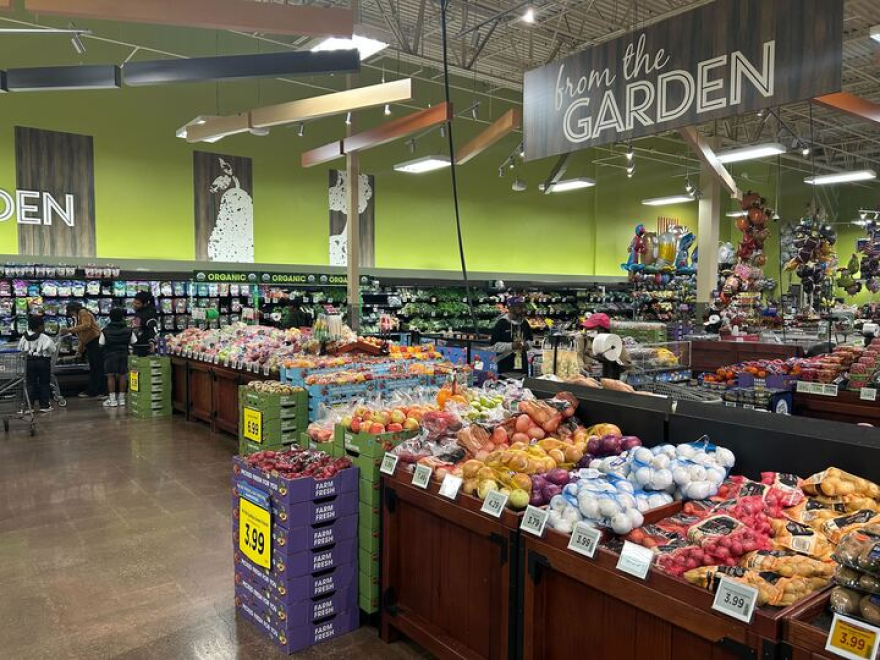Dominique Lewis walks past cars lining Wayne Avenue as they wait to get into the Lincoln Heights Outreach drive-thru food pantry.
She's got an umbrella in one hand to shield her from the snow. In the other hand, she's got a gallon of milk and a large sack of food.
Lewis is rushing to get to work but had to stop into the pantry. She says the government shutdown has made it hard to know if she'll be able to afford food.
“With the SNAP issues going on, I didn’t know if I’d have enough to get food items for Thanksgiving, so I thought I’d come out,” she says.
Lincoln Heights Outreach is doing the special Monday food distribution in conjunction with the Hamilton County 513 Relief Bus. It's in response to the disruption in SNAP benefits. Outreach Program Manager Tess Balsley says their pantry has seen a spike in demand since benefits ceased Nov. 1.
“It was rather shocking how quick the impact hit us here,” she says. “We normally serve around 110 families for our drive-thru, and immediately after SNAP benefits were cut, we jumped up to 140. And our numbers have been increasing ever since.”
Charmaine Jackson is in one of the cars lined up for the food distribution. She’s a hairdresser by trade, but has been off work due to back surgery. During that time, she’s relied on SNAP. At least until her benefits ceased.
“That’s why I’m here,” she says of the shutdown. “We do need the food, and the pantries are the ones helping everybody out.”
Balsley says an uptick in donations and a 50% discount on food items the pantry buys from the Freestore Foodbank have helped meet the increased demand. But she says more people line up than they have food for.
“At some point, we’ll run out of food and have to start turning people away,” she says. “And that, I’ve heard, has been the case everywhere.”
But other local organizations and individuals are stepping in to fill the gaps.
Neighbors take action
Cincinnati area institutions, and in some cases, regular people, are picking up the slack to help those in need. The Freestore Foodbank received a financial boost from the state of Ohio to provide emergency relief while benefits are unavailable. Elsewhere, the Cincinnati Hamilton County Public Library is getting the word out about its after-school meal program at 18 locations. The library’s meal services partners with a local food bank to provide prepackaged and sometimes hot meals to kids and teens Monday through Friday for a few hours each afternoon. The library's Joe Armstrong says the program has been around for years, but during the shutdown more kids have come in for meals, and he can tell it’s appreciated.
“They’re so thrilled,” Armstrong told WVXU. “It’s one of the busiest times at the library and it really livens up the space, where you hear kids laughing and having fun with each during a good meal.”
In Anderson Township, Liz Fitzgerald, a mother of three, is buying other people's groceries. She recently joined a grocery buddy program created in a Facebook group for moms. It connects volunteers directly with people on SNAP, giving them a few different ways to provide direct assistance.
“You can meet them at the grocery store and walk the grocery store with them, go shopping, and check out for them," Fitzgerald said. "You can get their list directly and order delivery for them. You can provide cash donation or gift card donation.”
Grocery buddies recommend volunteers donate or spend around $50 for each person in a household in need of assistance. Fitzgerald says she spends between $250 to $300 a week on the program, which is about what she spends to feed her own family. While expensive, she says the immediate relief it provides for her neighbors is well worth it, and she’s willing to stay in it for as long as the pause lasts.
Fitzgerald says grocery buddies plans to stick around and help with increasingly expensive grocery bills even after the shutdown comes to an end. “As families do get their SNAP benefits restored, the reality is sometimes it's not enough,” she said. “Emergencies happen, or the holidays happen, where money is really tight.”
The grocery buddies website says on its first day alone, it helped 36 people buy food.
Everyone has to 'make it work'
Lewis, the person with the umbrella walking from the pantry on her way to work, says she hopes Congress can reach a budget deal soon.
“I just have to make it work until they come up with a resolution,” she says.
Congress has taken steps in that direction. Several Senate Democrats signaled Sunday they'd vote for a budget deal with Republicans that does not include a renewal of Affordable Care Act subsidies. But any deal would need to go back to the House and get the president's signature before the government could reopen.
In the meantime, the Trump administration has been in a battle with federal courts to avoid further funding SNAP as the shutdown wears on.
Read more:



